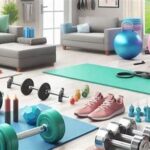How to Start Yoga When You’re Completely New
Read More : Yoga For Mental Clarity And Better Sleep
Starting a new journey can be both thrilling and intimidating, especially when it comes to yoga. The ancient practice offers a plethora of benefits, from enhanced flexibility and strength to improved mental wellness. Yet, for beginners, the sheer variety of styles, poses, and philosophies can seem overwhelming. So, how to start yoga when you’re completely new without feeling lost? Let me take you on an engaging and enlightening adventure through the world of yoga, tailored for novices like you.
Imagine this: You’re on a quest for tranquility amidst the chaos of daily life. You’ve heard yoga is the golden ticket to balance and serenity. But as a complete beginner, you find yourself drowning in questions. Which class should you take? What should you wear? And, can you really do those poses without resembling a pretzel? Fear not, dear reader, for you’re not alone in this expedition. Many have embarked on this path, and their testimonies echo the sentiment that taking the first step is the hardest. But once you’ve decided on “how to start yoga when you’re completely new,” the rest will follow naturally.
Now, how to start yoga when you’re completely new? Begin by setting realistic goals. Yoga is not about reaching the perfection seen in Instagram photos but about personal growth. Start with a beginner-friendly class or an online tutorial. Remember, it’s okay to modify poses that feel too challenging. Bring a sense of humor to your practice. Laugh when you topple over or when you can’t touch your toes. Yoga, after all, is as much about joy as it is about contemplation.
Choosing the Right Yoga Style
Finding the right style is paramount in your yoga journey. Hatha yoga is an excellent starting point for beginners due to its slower pace and focus on basic postures. If you’re someone who thrives in a dynamic environment, Vinyasa might suit you better as it involves more fluid movements. Explore different classes online, or watch YouTube tutorials to get a feel of what resonates with you. Always remember the golden tenet: yoga is personal. What works for others might not work for you, and that’s perfectly okay. Your journey on how to start yoga when you’re completely new should be paced with patience and self-discovery.
—Structuring Your Yoga Journey
Embarking on the path of yoga as a newbie might seem overwhelming. The first step is understanding that yoga is more than just physical exercise; it’s a holistic practice that combines body, mind, and spirit. This fusion is essential for those wondering how to start yoga when you’re completely new. There’s beauty in the basics, and starting with foundational poses, such as mountain pose or downward dog, can ease you into the practice.
Yoga is like a hearty meal; it should never be rushed. Allocate specific times in your week to practice and stick to them as religiously as your coffee ritual. Establishing a routine is key to evolving from a novice to a seasoned yogi. A consistent schedule will foster discipline and help track your progress. Gradually, the once-daunting idea of “how to start yoga when you’re completely new” will transform into an exciting journey of self-discovery.
Essential Yoga Gear
One cannot simply dive into yoga without equipping themselves with the right tools. The cornerstone is a good-quality mat that provides cushioning and grip. Comfortable clothing that allows for flexibility will enhance your practice. As a beginner, you might also find yoga blocks and straps beneficial as they help modify complicated poses.
Venturing into the yoga realm might spark an interest in other wellness activities. Look into meditation classes to augment the mindfulness aspect of your practice. Remember that yoga isn’t a sprint but a rewarding marathon. Be patient and savor each part of the journey.
Joining a Yoga Community
Another effective strategy in learning how to start yoga when you’re completely new is to engage with a community of like-minded individuals. Joining local classes or online forums can create opportunities for shared experiences and mutual motivation. Here lies the power of community: encouragement to persevere, shared laughter, and tips exchanged between novices and seasoned practitioners.
Participating in community events, such as beginner workshops or retreats, can bolster your confidence. These experiences can clarify doubts, reinforce learning, and maybe even spark lifelong friendships. Stepping into the world of yoga as a beginner is daunting but immensely rewarding. Approach it with an open mind and an enthusiastic heart, and let the journey unfold.
—Discussion Points on “How to Start Yoga When You’re Completely New”
- Understanding the Basics: Is it crucial to begin with breathing exercises before mastering poses? The importance of pranayama cannot be overstated for beginners. It lays the foundation for mindfulness and physical practice.
- Overcoming Insecurities: How does one deal with the self-consciousness of being a novice amidst a class of experienced practitioners? Finding comfort in your personal journey is paramount.
- Setting Realistic Goals: Beginners often set lofty goals and feel discouraged. How can one set achievable objectives in yoga and track progress effectively?
- Finding the Right Instructor: What should you look for when selecting a yoga instructor for beginners? The balance between expertise and teaching style is crucial.
- Virtual vs. In-person Classes: With the advent of virtual learning, is practicing yoga online as effective as attending in-person sessions for beginners?
- Yoga and Lifestyle Changes: How does introducing yoga into one’s routine affect daily life and mindset? The ripple effect yoga has on lifestyle choices is noteworthy.
- Injury Prevention: What are some common mistakes beginners make which lead to injuries, and how can these be avoided?
- Cultural Aspects: Understanding the cultural roots of yoga can enrich a beginner’s practice. How important is it to delve into the history and philosophy of yoga as a newcomer?
The Mind-Body Connection
Yoga newbies often find themselves in awe of the profound mind-body connection fostered through regular practice. The beauty of yoga is that it harmonizes the physical with the mental, resulting in a sense of completeness. However, achieving this balance requires patience, which needs to be emphasized for anyone asking how to start yoga when you’re completely new. The realization that every breath and movement is interconnected within your practice adds depth to each session.
Engaging with meditation enhances this connection further, instilling a sense of mindfulness that transcends the yoga mat. Beginners might initially struggle with quieting their minds, but consistent practice reveals the tranquility that yoga promises. Explore guided meditations available online or attend mindfulness workshops to deepen your understanding. Perfection isn’t the goal; rather, it’s about the journey towards self-awareness and peace.
Practicing Patience and Persistence
Beginners often need to remind themselves that yoga is a personal journey that thrives on patience and persistence. The incremental progress may not be immediately apparent, but each session adds a significant layer to your practice. Celebrate small victories — whether that’s holding a pose longer or reaching a new level of flexibility.
It’s essential to practice without judgment, both from yourself and others. This mindset facilitates growth and aids in overcoming the initial obstacles faced when you decide how to start yoga when you’re completely new. As the journey unfolds, you’ll find that yoga has a way of weaving itself subtly into the fabric of your life, influencing everything from your stress levels to your perspective on challenges. Embrace this transformation and let yoga be your guide.


